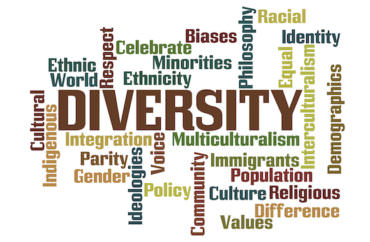On most campuses today, “diversity” is an almost-religious principle: We are told that it is one of the chief aims of a university to increase the diversity of its student body, that not enough is being done, and that many schools are shortcoming their students by not doing enough to diversify their campuses.
Whether or not that is broadly true (hint: it’s not really), it is certainly not the case at the University of California, Los Angeles, which has been “engulfed by the diversity obsession,” Heather Mac Donald writes at The LA Times.
 In its latest sop to diversity, Mac Donald writes, UCLA will now force all applying faculty members to “document their contributions to ‘equity, diversity and inclusion’.” These testaments to diversity “will be credited in the same manner as the rest of an applicant’s portfolio, according to UCLA’s equity, diversity and inclusion office.”
In its latest sop to diversity, Mac Donald writes, UCLA will now force all applying faculty members to “document their contributions to ‘equity, diversity and inclusion’.” These testaments to diversity “will be credited in the same manner as the rest of an applicant’s portfolio, according to UCLA’s equity, diversity and inclusion office.”
As Mac Donald notes, a contemporary Albert Einstein might fail to meet this new criteria for application at UCLA (“Sadly, he may have been focusing on the theory of general relativity instead,” she writes). From the lack of “potential to understand the barriers facing women and racial/ethnic minorities” to an inability to “effectively teach and attract students from underrepresented communities,” the new diversity requirements may end up boxing out many qualified candidates who simply don’t conform to the needs of the diversity bureaucracy.
“As the new mandate suggests, UCLA and the rest of the University of California have been engulfed by the diversity obsession,” Mac Donald writes:
The campuses are infatuated with group identity and difference. Science and the empirical method, however, transcend just those trivialities of identity that UC now deems so crucial: “race, ethnicity, gender, age, religion, language, abilities/disabilities, sexual orientation, gender identity and socioeconomic status,” to quote from the university’s Diversity Statement. The results of that transcendence speak for themselves: an astounding conquest of disease and an ever-increasing understanding of the physical environment. Unlocking the secrets of nature is challenge enough; scientists (and other faculty) should not also be tasked with a “social justice” mission.
But such a confusion of realms currently pervades American universities, and UC in particular. UCLA’s Intergroup Relations Office offers credit courses and “co-curricular dialogues” that encourage students to, you guessed it, “explore their own social identities (i.e. gender, race, nationality, religion/spirituality, sexual orientation, social class, etc.) and associated positions within the campus community.” Even if exploring your social identity were the purpose of a college education (which it is not), it would be more fruitful to define that identity around accomplishments and intellectual passions — “budding mathematician,” say, or “history fanatic” — rather than gender and race.
Intergroup Relations is just the tip of the bureaucratic diversity iceberg. In 2015, UCLA created a vice chancellorship for equity, diversity and inclusion, funded at $4.3 million, according to figures published by the Millennial Review in 2017. (The EDI vice chancellor’s office did not have its current budget “at the ready,” a UCLA spokesman said, nor did Intergroup Relations.) Over the last two years, according to the Sacramento Bee’s state salary database, the diversity vice chancellor’s total pay, including benefits, has averaged $414,000, more than four times many faculty salaries. Besides his own staff, the vice chancellor for equity, diversity and inclusion presides over the Discrimination Prevention Office; BruinX, the “research and development arm of EDI”; faculty “equity advisors”; UCLA’s Title IX office; and a student advisory board. Various schools at UCLA, including medicine and dentistry, have their own diversity deans, whose job includes making sure that the faculty avoid “implicit bias in the hiring process,” in the words of the engineering school’s diversity dean.
“These bureaucratic sinecures are premised on the idea that UCLA is rife with discrimination, from which an ever-growing number of victim groups need protection,” Mac Donald writes. But as she notes: “UCLA and the University of California are among the most tolerant, welcoming environments in human history for all races, ethnicities and genders. Every classroom, library and scientific laboratory is open to all qualified students on an equal basis.”
IMAGE: Shutterstock.com
Like The College Fix on Facebook / Follow us on Twitter




Add to the Discussion